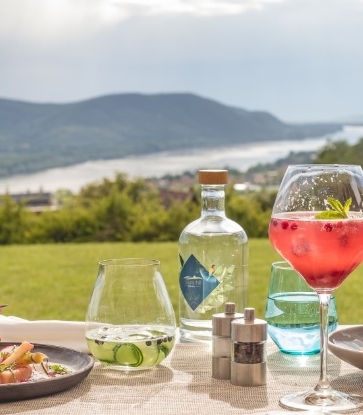When Dan Cox walked on stage at The Midland Hotel to accept his Michelin Star chef’s jacket, his restaurant became the fourth in county of Cornwall to hold that honour. Yet even among the illustrious company of Paul Ainsworth and Nathan Outlaw, Dan’s achievements at Crocadon stand out. With the help of Head Chef Michael Thompson and a whole team of dedicated professionals, he has given us proof – if we ever needed it – that Michelin Star dining can rediscover its ties to the world around us, powered by the undeniable deliciousness of good, natural produce.
One year before receiving its One Star accolade, Crocadon was the recipient of a Michelin Green Star. Created to recognise those restaurants that lead the way in sustainable gastronomy, the Green Star has rarely been more richly deserved than here. It took Dan and his team four years to get the farm which powers Crocadon off the ground, uncompromisingly sticking to their ethos that to cook the best, you must first grow the best.

Farm First
Nestled in the picturesque Cornish countryside, Crocadon is – according to Dan – a farm first and a restaurant second. “We’re a business focussed on our soil basically,” he says. “I took on a 120 acre organic farm with the intention of opening a restaurant eventually.” It took years to cultivate the land to a point where Dan could realise his dream, but it was well worth the wait.Crocadon is a shining example of ‘field to fork’ dining and how this approach can lead to better results not just for the planet, but also for the palette. “Crocadon is about challenging everything when it comes to farming, growing, food supply – and refining our ingredients to the point that we know they’re free from toxicity,” Dan explains.
His words highlight the concept of 'closing the loop' that is key to Crocadon’s approach. Rejecting the lengthy chains often involved in food sourcing and production, the aim here is to source as much food as possible from within their own estate. Vegetables, wheats and grains are grown on the farm, where they also rear their own animals for meat and dairy. Butter, cheese and yoghurt are all produced in-house too, so that as little enters or leaves the farm as possible.

The methods used to produce these ingredients always have an eye on keeping the farm healthy, too. ‘Organic’ is a word often thrown around in the food industry, but at Crocadon they take farming practices seriously. Growing perennials helps to produce healthy crops year after year, whilst regenerative farming methods, soil health and biodiversity are all prioritised. There isn’t a chemical treatment in sight, with their biological alternatives made from ingredients grown and foraged on their land.
For Dan, inspiration for this way of working came from his time working with Simon Rogan, holder of Three Michelin Stars, as well as another Green Star chef. “We’re incredible friends,” Dan says. “Building the farm with him up at L’Enclume was a pivotal moment for me. Once you've seen produce grown from start to finish, you've actually put it on a plate, you've brought people around the farm, you’ve cooked for them directly in Aulis… it's very hard to go back from that.” So instead of going back, Dan decided to take the Rogan way and run with it.
Inspector Insights
To find out more about what has made the Crocadon project such a success, we asked a Michelin Inspector to share their thoughts. Here’s what they had to say:“When visiting a Green Star restaurant, I always want to really feel their commitment to sustainability. It’s great to read all about a restaurant’s various schemes and programmes, but I personally get excited when a chef or waiter explains their ethos to me, and when I can see the results of that ethos on the plate. This is never more the case than at Crocadon, where you can see the farm in front of you, and its ingredients are presented in their natural glory. My visit, for example, began with a mini ‘tomato Tatin’ tart that carried such an intense, sweet flavour thanks to the top-drawer tomatoes.
“It was Head Chef Michael Thompson working wonders in the kitchen during my visit, while Dan Cox slipped effortlessly into the role of host. As he served dishes and chatted to diners, it was clear that the farmer in him was never far away – such passion emanates from Dan when he discusses the Crocadon approach, that his enthusiasm for farm-to-table dining becomes infectious. As I left, I was convinced not just of the merits of Crocadon’s philosophy, but of its straightforwardly delicious results.”
Beyond the Kitchen
Not one to do things by halves, Dan has extended the Crocadon ethos into every corner of the place – making it a haven for the sustainably-minded. In line with their aim of keeping production as local as possible, there’s a small brewery housed on the land, which was initially run by Dan and the team but has now been handed over to the Ideal Day Family Brewery. A relatively new addition to the complex is a bakery, where bread and pastries are made using leftovers from the kitchen, then used in the restaurant or sold in the café.
When it comes to waste, the Crocadon way is, as ever, to go beyond the buzzwords. Not only are most of their kitchen leftovers returned to the farm to help grow future crops, but any waste materials that cannot be composted are turned into the fixtures and fittings you find in the dining room.
Amongst all of the fabulous initiatives and projects at Crocadon, perhaps the most impressive is their on-site pottery. This provides tableware for the restaurant and is used by local ceramicists too, with the team making their own ash glazes by burning down bones and meat scraps left over from the kitchen. It may be a small detail, but it is the perfect encapsulation of how far Dan’s ethos has gone and a fitting microcosm of how Crocadon continues to offer Michelin Star dining that’s a little bit different.

















